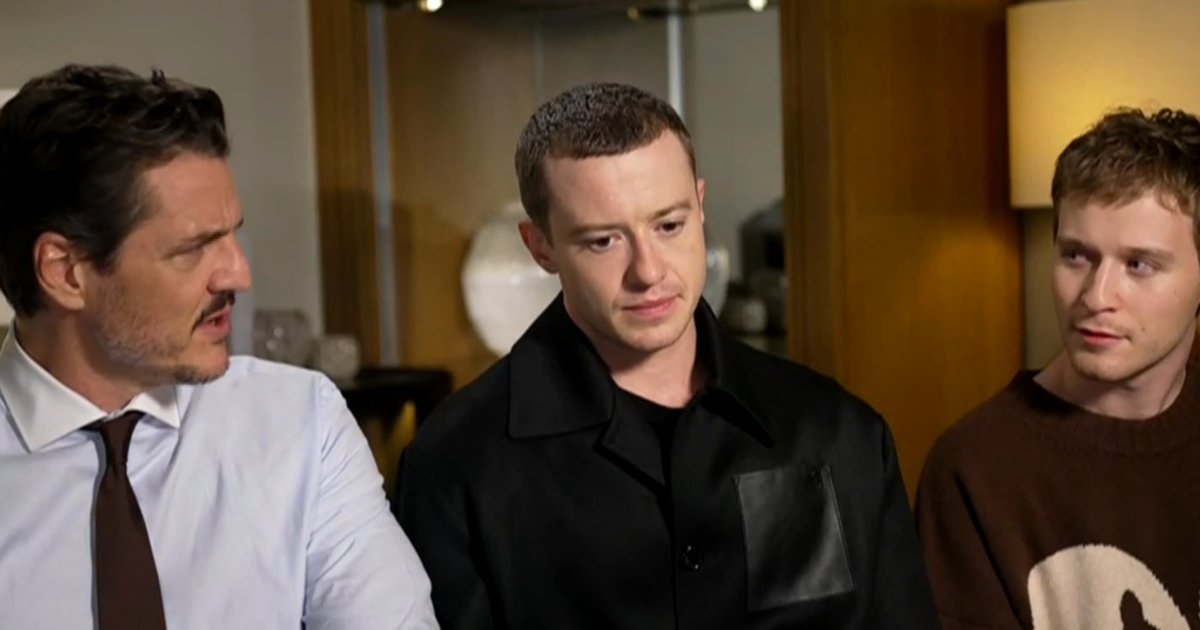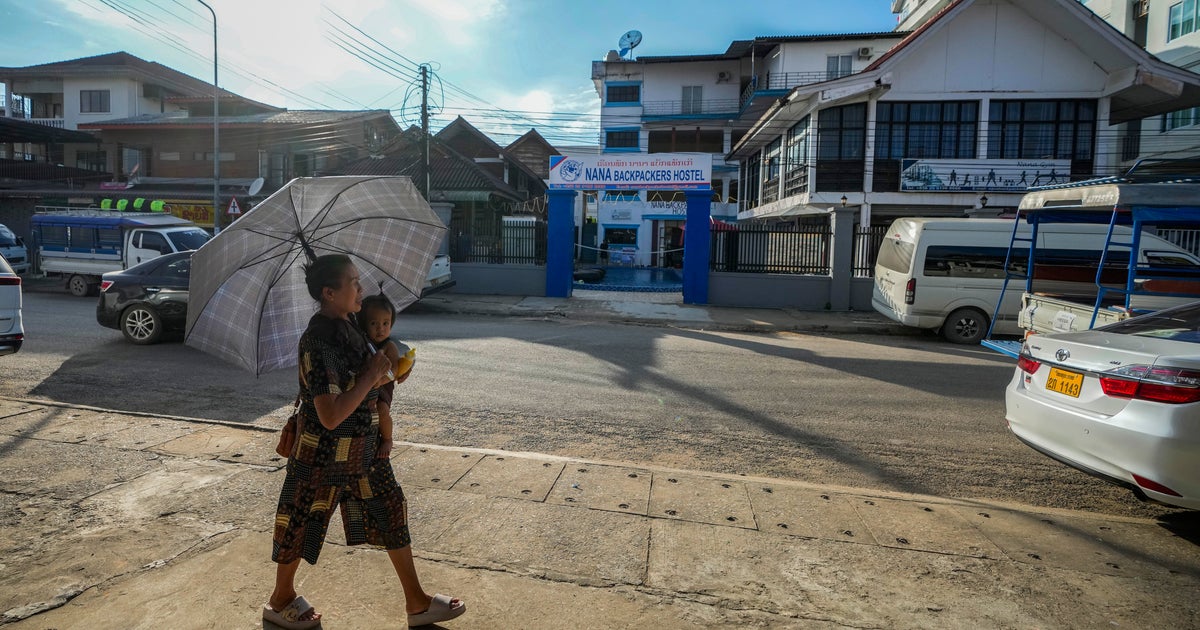You've seen the image. Now, hear a widow recall how her husband and daughter drowned in the Rio Grande
This summer, an image of desperation was captured on the bank of the Rio Grande. If you saw the photo, you may never forget it. A father and his 23-month-old daughter, facedown in the muddy river. The two drowned trying to get to the United States.
Like hundreds of others who have died trying to cross the river illegally, many of the details of their lives and how they died were either a mystery or reported incorrectly. But tonight, you'll hear from the only person who knows the story behind that photo, including the moment she saw her husband and daughter swept away.
Her name is Tania Avalos. And last month in El Salvador, she told us her story.
It was the photo that appeared on the front page of newspapers. A father with his young daughter tucked inside his T-shirt face down on the bank of the Rio Grande.
But this is the photo Tania Avalos wants you to remember of her family. That's her, with her husband, Oscar, and daughter, Valeria. It was taken on Valeria's first birthday.
Tania had not spoken to anyone about what happened to them. But she told us she wanted to talk about her faith, so that was our first question.
Sharyn Alfonsi: Tell me about your faith and how your faith has guided you through the last few months.
Tania Avalos (Translation): First, I'd like to thank God, above all… for the opportunity he's giving me to share a message with the world ... so they can see and think that sometimes ... bad decisions ... are really painful.
Tania and Oscar met five years ago. She told us she was attracted to his quiet confidence.
Tania Avalos (Translation): Ask anyone, "What's Oscar like?" and they'll tell you wonderful things about him. "God gave me a good man. He would say to me, "I want to be a father. I want to be a father of a little girl." And I would say, "Calm down! I have to study!" And so at the end-- we formed a family.
The daughter Oscar wanted so badly was born in July of 2017. Tania showed us family photos.
Sharyn Alfonsi: Oh, she looks like daddy, too. So cute.
At a year old, she was trying to learn to pronounce her own name, Valeria.
Sharyn Alfonsi: Tell me about Valeria.
Tania Avalos (Translation): My daughter... was an extraordinary girl... very intelligent. Everyone called her by her nickname, "Coo-low-CHEE-tah," because she had curly hair. She loved to dance. I would go to work… I had a job that took all of my time. And I would say, "For you… my love... for you we do all this."
The young family lived on the outskirts of San Salvador in a suburb called San Martin. It has the same problems as much of the country, a third of its residents live on less than $5.50 a day and gang violence is rampant.
El Salvador has the highest homicide rate of any country not at war.
Tania and Oscar's neighborhood was controlled by the Barrio 18 gang, which demands protection money from businesses and some people's paychecks.
Tania worked at a Chinese restaurant. Oscar at a pizza place. They lived in a small house with his mother.
Sharyn Alfonsi: What were your dreams for your family? What did you hope? Why did you leave home?
Tania Avalos (Translation): Our dream was to move our family forward. Every human being has dreams. [Oscar] was a person who would say… I don't want my mother to have to work. I don't want my father to have to work… I want us all to get ahead.
Oscar, 25 years old, sold his most valuable possession: his motorcycle. And in March, the young family left El Salvador for the United States.
Their first stop was the city of Tapachula on Mexico's border with Guatemala.
There, the family waited for a travel visa that would allow them to go through Mexico. To support the family, Oscar worked at a food stand for $7.50 a day.
Tania Avalos (Translation): We stayed for two months in Tapachula. Every day was a new day and a new challenge ... but always in God's hands.
"Our dream was to move our family forward."
In Tapachula, Oscar met another Salvadoran, Milton Paredes. The four of them decided to rent a room together, and later, to make the bus trip to the U.S. border. Tania told us they didn't have any money after they spent $300 on the bus tickets.
It took 32 hours to make the thousand-mile trip. They arrived in Matamoros, Mexico, in the early morning of Sunday, June 23.
The border town was a blistering waiting room for Central Americans hoping for asylum in the United States.
According to data from the Department of Homeland Security, there was at least a two-month wait to see a U.S. immigration judge. Even then, just two out of ten Salvadorans meet the threshold to be granted asylum.
Oscar, Tania and Milton didn't know those odds when they got to Matamoros and they'd spent all of their money. Soon after they arrived, they went to cross the main bridge that stretches over the Rio Grande to Brownsville, Texas.
But Tania and Milton both told us they were stopped on the Mexican side by thugs who demanded $1,300 to pass over the bridge.
Tania Avalos (Translation): We probably spent a good amount of time walking around and thinking about what we were going to do. So, we thought, let's cross the river because we don't have any money to pay someone to get us across to immigration." Right then and there, we decided that we were going to cross the river.
They went to the banks of the Rio Grande, known in Spanish as the Rio Bravo or "rough river." Here, it's about 50 yards wide. America appeared to be in reach. Tania said they made the decision to swim across the river and enter the United States illegally.
Tania Avalos (Translation): We said to each other, "The time is now. The time is now for us to do this."
"My God, my Lord, please get them out of there."
Their improvised plan was to surrender to the U.S. Border Patrol once they got to the other side. Oscar swam across the river first to see if anyone would stop them.
Tania Avalos (Translation): He was signaling to us that no one was there. So then, he came back, because I was on the [Mexican side] with my daughter. I said to him, "I'm scared." And he said to me, "Everything's going to be fine."
The surface of the Rio Grande appears calm. But emergency responders in South Texas told us the river's current can be unpredictable and ferocious enough to suck you under.
Tania couldn't swim so they decided Milton, who was a strong swimmer, would carry her on his back. Oscar decided to carry his daughter, Valeria.
Tania Avalos (Translation): He put our daughter inside his shirt. Obviously, he couldn't carry her on top because she might fall off, but since he was thin and his shirt was very big, our daughter fit perfectly inside, and he started to swim, and I followed behind him. And I saw him doing okay, I mean, he was close, very close, and I noticed him starting to get frustrated.
Tania Avalos (Translation): I could see that he was coming up and going under.
Tania told us that in her panic she was barely able to hold on to Milton as he turned back.
Tania Avalos (Translation): I swallowed so much water, I swallowed so much water, and I was desperate. And I got out, I got out on the Mexican side, and I could still see [my husband] there, struggling, struggling, along with my daughter. I saw her. I saw her. And I said, "My God, my Lord, please get them out of there."
Tania Avalos (Translation): And I just saw [my husband] giving me a glance, and then, I couldn't see him anymore. I could not see him anymore.
Tania showed Mexican officers where she saw Oscar and Valeria last. Divers suspended their search at sundown.
Tania Avalos (Translation): They took me to the migrants' shelter in Matamoros. When I walked in, I saw a lot of immigrants from different countries, and I started telling them, "Don't sacrifice your children. Pray to the Lord, and he will give you everything you want, but don't emigrate."
Oscar and Valeria's bodies were discovered the next morning, washed up on the Mexican side of the river. A photographer was there and snapped the now famous photo. Father and daughter in a final embrace.
In the days that followed, the image became a global symbol of the crisis at America's southern border. It prompted a brief moment of bipartisan reflection for a Congress deadlocked on immigration.
Within a week, Congress did pass an emergency multi-billion dollar package to hire new judges and build facilities to deal with the surge of Central Americans at the U.S. border. Since then, the Congress has not passed any immigration legislation.
Tania Avalos (Translation): After this all happened, many people wrote to me. They said they were very sorry. Others called me names and told me that I was greedy, that I put my daughter's life at risk that I didn't love them, and they made me feel so bad.
Since Oscar and Valeria died in June, the bodies of at least 52 more migrants have been found in the Rio Grande, four of them, children. Most of their stories are unknown.
This story ends with a 21-year-old widow. And a modest memorial on the bank of the river. It reads "In memory of little Valeria and her papa Oscar."
Sharyn Alfonsi: Do you have family here, family supporting you? What is your life like now that you've been back?
Tania Avalos (Translation): I do. I have my mother and my siblings. I almost never cry at home because I'm afraid they'll feel bad. I hold it all in. But there are times when I just break completely. I cry all I have to cry. I wash my face and I go out, and I go back to work. And I keep going.
Produced by Guy Campanile. Associate producer, Lucy Hatcher. Broadcast associates, Claire Fahy and Cristina Gallotto.







